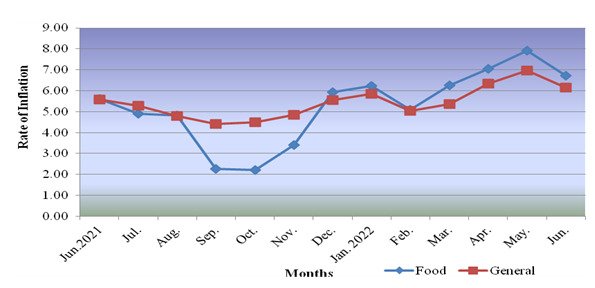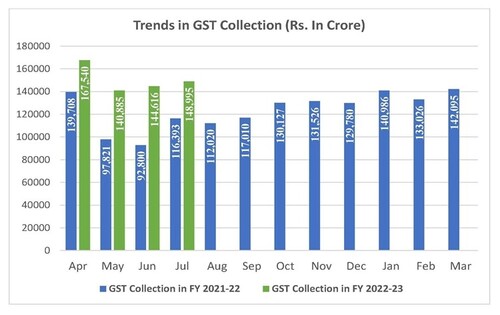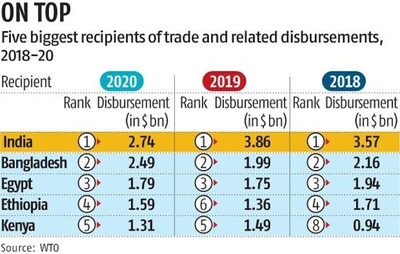Topic: Indian Economy/Financial Market
1. Retail inflation for industrial workers declined from 6.97% in May 2022 to 6.16% in June 2022.
- Inflation based on Consumer Price Index for Industrial Workers (CPI-IW) stood at 5.57% during the corresponding month a year ago (June 2021).
- Food inflation was at 6.73% in June 2022 against 7.92% in May 2022 and 5.61% in June 2021.

Y-o-Y Inflation based on CPI-IW (Food and General)
(Source: PIB)
- For June 2022, All-India CPI-IW increased by 0.2 points. It stood at 129.2 points. It stood at 129 points in May 2022.
- The maximum upward pressure in CPI-IW for June 2022 came from Food & Beverages group. It contributed 0.20 percentage points to the total change.
- Puducherry recorded a maximum increase (2.6 points) followed by Amritsar (2.2 points) and Tripura (2.0 points).
- Sangrur recorded a maximum decrease of 2.4 points. 6 centres’ indices remained stationary.
- Consumer Price Index for Industrial Workers (CPI-IW):
- It is compiled by the Labour Bureau every month. The base year for CPI-IW is 2016.
- It is compiled on the basis of retail prices collected from 317 markets spread over 88 industrially important centres in the country.
- The index is released on the last working day of succeeding month.
Topic: Banking System
2. Deutsche Bank’s IFSC Banking Unit (IBU) at GIFT-IFSC in Ahmedabad inaugurated by PM Modi.
- The Deutsche Bank’s IBU at Gujarat International Finance-Tec City (GIFT City) will offer financial products across trade finance, fixed income and currencies in the starting phase.
- It will facilitate cash pooling for Indian and international clients. It will also facilitate external commercial borrowing (ECB) financing for its prime customers.
- Deutsche Bank is a German multinational investment bank.
Topic: Indian Economy/Financial Market
3. The share of exports of goods and services in GDP has increased by 2.7% between 2020-21 and 2021-22.
- The share of exports of goods and services in GDP has grown from 18.7% in 2020-21 (FY21) to 21.4% in 2021-22 (FY22).
- The overall share of goods export in GDP has increased by 2.4% from 10.9% in 2020-21 (FY21) to 13.3% in 2021-22 (FY22).
- Engineering goods contributed maximum (3.53%) to the share of the goods exports in the annual GDP in 2021-22.
- Engineering goods were followed by petroleum products (2.13%), gems and jewellery (1.23%), organic and inorganic chemicals (0.93%) and drugs and pharmaceuticals (0.78%).
- The share of exports of goods and services was 18.8% of GDP in financial year 2017-18. It was 19.9% in FY 2018-19. It declined to 18.7% in FY 2019-20.
Topic: Appointments
4. Auguste Tano Koume has replaced Junaid Kamal Ahmad as World Bank’s Country Director for India.
- His appointment as World Bank’s Country Director for India has become effective from 01 August 2022.
- He recently served as the World Bank’s Country Director for the Republic of Türkiye.
- Auguste is a national of Côte d’Ivoire (a country on the southern coast of West Africa).
- India is the World Bank Group’s largest client.
- In 2021-22 FY, India has taken a loan of $3.98 billion from the International Bank for Reconstruction and Development (IBRD) and $83 million from International Development Association (IDA).
- World Bank:
- It is an international financial institution founded in 1944.
- It provides loans and grants to governments of poor countries for capital projects.
- It is headquartered in Washington DC, the United States and David Malpass is its President.
Topic: Taxation
5. E-invoicing will be compulsory for businesses with aggregate turnover of over ₹10 crore from October 1, 2022.
- As of now, e-invoice is mandatory for businesses having an annual turnover of more than ₹20 crore.
- Finance Ministry has issued a notification for lowering the threshold after the recommendation by the GST Council.
- E-invoicing provides a standardised format of an invoice that a machine can understand.
- The Goods & Services Tax Network (GSTN) uses this system to electronically authenticate B2B invoices before they can be used on the common GST portal.
- Every invoice submitted through the electronic invoicing system will receive an identification number from the GSTN-managed invoice registration portal (IRP).
- If businesses that are mandated to use electronic invoicing do not do so, their invoice will not be valid.
- The recipient is not allowed to claim Input Tax Credit (ITC) on such invoice, and additional penalties may apply.
- GSTN has empanelled various accounting and billing software products.
- They provide basic accounting and billing systems free of cost to small taxpayers (businesses having a turnover of less than ₹1.5 crore).
- Goods and Services Tax Network (GSTN) provides GST related IT infrastructure and services.
Topic: Reports and Indices
6. Manufacturing PMI increases from 53.9 in June 2022 to 8-month high level of 56.4 in July 2022.
- Services PMI has declined from 59.2 in June 2022 to four-month low level of 55.5 in July 2022.
- Presently, share of manufacturing in Gross Value Added (GVA) is more than 14% (14.4%). Share of services is around 55%.
- Purchasing Managers’ Index (PMI) is prepared by S&P Global and based on survey among 400 managers. Index above 50 means expansion, while below 50 shows contraction.
- Like manufacturing, services PMI is prepared by S&P Global on the basis of responses from 400 service sector companies.
- The sectors include consumer (excluding retail), transport, information communication, finance, insurance, real estate and business services.
Topic: Taxation
7. GST revenue collection in July 2022 is second highest revenue since introduction of GST.
- Over 1,48,995 crore rupees gross GST revenue has been collected in July 2022.
- Finance Ministry said GST revenue collection for July 2022 is 28% higher than the revenues in July 2021.
- Finance Ministry said the monthly GST revenues have been more than 1.4 lakh crore rupees for five months in a row. It has shown steady increase every month.

(Source: Ministry of Finance)
Topic: Reports and Indices
8. RBI has published Financial Inclusion Index (FI Index) for March 2022.
- The value of FI Index improved from 53.9 in March 2021 to 56.4 in March 2022.
- Growth has been witnessed across all the sub-indices of FI Index.
- RBI had constructed a composite Financial Inclusion Index (FI-Index) to capture the extent of financial inclusion across the country.
- RBI had published it in August 2021 for the FY ending March 2021.
- The annual FI-Index for the period ending March 2017 was at 43.4.
- The Index has been constructed without any ‘base year’. It captures information on various aspects of financial inclusion in a single value.
- The value may range between 0 and 100. 0 shows complete financial exclusion. 100 shows full financial inclusion.
- It comprises of three broad parameters. The parameters are access (35% weight), usage (45% weight), and quality (20% weight).
- The index is responsive to access, usage of services, and quality of services, in all 97 indicators.
Topic: Banking System
9. HDFC Bank Parivartan has signed ₹107.76 crore MoU with Indian Institute of Science, Bengaluru.
- As part of MoU, HDFC Bank has pledged ₹107.76 crore for the construction of Bagchi-Parthasarathy Hospital at IISc Bengaluru.
- The bank will support three wings of the multi-speciality, not-for-profit hospital, which is being developed by IISc.
- HDFC Bank:
- HDFC Bank is India's largest private sector bank. It is India’s second largest lender after State Bank of India.
- It is headquartered in Mumbai. It was founded in 1994. The CEO of HDFC Bank is Sashidhar Jagdishan.
Topic: Reports and Indices
10. India has received the highest aid for trade from developed countries in 2020.
- In 2020, India received $2.7 billion as aid from developed countries for trade. India received $3.9 billion in 2019.
- Bangladesh is the second largest recipient of aid from developed countries, followed by Egypt, Ethiopia, Kenya, Vietnam, and Pakistan.
- The Joint Aid for Trade at a Glance 2022 report has been released by the WTO and the Organisation for Economic Cooperation and Development (OECD).
- World Bank, European Union Institutions, and Asian Development Bank are the top institution donors.
- Japan, the United States, Germany, and France are among the top donor countries.
- In 2020, the total disbursement was $48.7 billion. Around $4.7 billion has been given for the Covid-19-related activities.
- Aid for trade is mainly for the least developed economies. It consists of aid for building supply-side capacity and trade-related infrastructure for international trade.




 Previous
Previous 
 Latest
Latest 








Comments